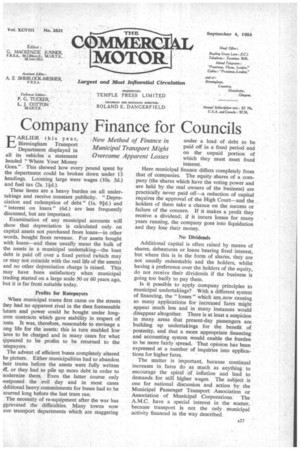Company Finance for Councils
Page 29

If you've noticed an error in this article please click here to report it so we can fix it.
EARLIER this yea r, Birmingham Transport Department displayed in all its vehicles a statement headed "Where Your. Money Goes." This showed how every pound spent by the department could be broken down under 13 headings. Looming large were wages (10s. 3d,) and fuel tax (2s. lid.).
These items are a heavy burden on all undertakings and receive constant publicity. "Depreciation and redemption of debt" (1s. 91d.) and "interest on loans" (6d.) are less frequently discussed, but are important.
Examination of any municipal accounts will show that depreciation is calculated only on capital assets not purchased from loans—in other words, bought from revenue. For assets bought with loans—and these usually mean the bulk of the assets in a municipal undertaking—the loan debt is paid off over a fixed period (which may or may not coincide with the real life of the assets) and no other depreciation charge is raised. This may have been satisfactory when municipal trading started on a large scale 50 or 60 years ago, but it is far from suitable today.
Profits for Ratepayers When municipal trams first came on the streets they had no apparent rival in the then foreseeable future and power could be bought under long:erm contracts which gave stability in respect of 3osts. It was, therefore, reasonable to envisage a ong life for the assets; this in turn enabled low 'arts to be charged and in many cases for what tppeared to be profits to be returned to the atepayers.
The advent of efficient buses completely altered he picture. Either municipalities had to abandon heir trams before the assets were fully written 1ff, or they had to pile up more debt in order to uodernize them. Even the latter course only lostponed the evil day and in most cases dditional heavy commitments for buses had to be icurred long before the last tram ran.
The necessity of re-equipment after the war has ggravated the difficulties. Many towns now ave transport departments which are staggering under a load of debt to be paid off in a fixed period and on the unpaid portion of which they must meet fixed interest.
Here municipal finance differs completely from that of companies. The equity shares of a company (the shares which have the voting power and are held by the real owners of the business) are practically never paid off—a reduction of capital requires the approval of the High Court—and the holders of them take a chance on the success or failure of the concern. If it makes a profit they receive a dividend; if it incurs losses for many years running, the company goes into liquidation and they lose their money.
No Dividends Additional capital is often raised by means of shares, debentures or loans bearing fixed interest, but where this is in the form of shares, they are not usually redeemable and the holders, whilst having a preference over the holders of the equity, do not receive their dividends if the business is going too badly to pay them.
Is it possible to apply company principles to municipal undertakings? With a different system of financing, the " losses " which are now causing so many applications for increased fares might appear much less and in many instances would disappear altogether. There is at least a suspicion in many areas that present-day passengers are building up undertakings for the benefit of posterity, and that a more appropriate financing and accounting system would enable the burden to be more fairly spread. That opinion has been expressed at a number of inquiries into applications for higher fares.
The matter is important, because continual increases in fares do as much as anything to encourage the spiral of inflation and lead to demands for still higher wages. The subject is one for national discussion and action by the Municipal Passenger Transport Association or Association of Municipal Corporations. The A.M.C. have a special interest in the matter, because transport is not the only municipal activity financed in the way described.




















































































